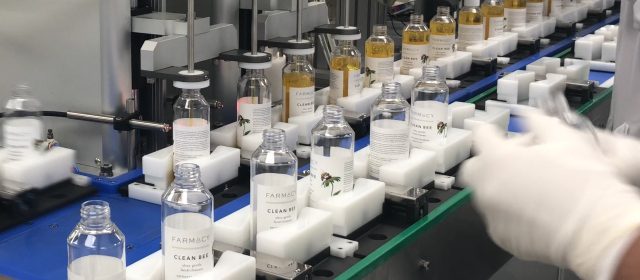New NJ Beauty Lab Centers Around Innovation and Influencers

Serial beauty entrepreneur David Chung — the man behind Farmacy, 3Lab and Englewood Lab — is starting yet another business.
Called iLabs, Chung's new venture is meant to bring innovative beauty products to a broad group of companies, including indie brands looking for small manufacturing runs. The 19-acre, 146,000 square-foot campus in Mahwah, N.J. is slated to officially open in January 2020.
The business operates in two different divisions. Chung calls them "disruption one" and "disruption two."
The first is centered around innovation. Chung plans to harness innovation coming from chemists based all over the world, and bring those products to market. In exchange, those chemists will be paid for their contributions.
Chung likens the concept to Airbnb. "This is more business to business, where I'm creating more entrepreneurs of chemists. They have great ideas, amazing thinking-outside-the-box chemists in Korea, Japan, France, Italy, but they don't have the platform to become an entrepreneur and make big money out of that," Chung said.
The innovation will be offered up to beauty brands, Chung said. iLabs will also have an in-house chemist team of between 20 and 30 people, as well as a co-working-type space called "WeLabs" where chemists can come, rent the space, and have everything they'd need on hand to work.
"The reason I'm doing that is not to make money on the space…but to create a think tank, brainstorming with ideas," Chung said. "The core of iLabs is all about R&D and innovation — we do manufacturing, but that is the key of the business model."
The resulting innovation will be put into a "library of formulas" that are ready to be used by those who choose to harness "disruption two" — the brand-building offering of iLabs.
"You go to any country in the world, and dream is to have a brand, but most of them don't know how to go about doing a brand…what we are doing here is creating this new platform to help them get off the ground, start a brand," Chung said.
The idea is that an influencer could go online, select their formulas and packaging, and voilà — they've created a brand. Influencers can start small, with a run of 10 or so, Chung said, and then if successful, could ramp up their order volumes. Influencers can use library formulations or customize them, he said.
The experience is meant to be as simple as shopping on Amazon, he said. "All the things you don't know, we'll do it for you," Chung said.
This is Chung's first manufacturing venture after exiting Englewood Lab in 2018. He's still involved in Farmacy, a farm-to-table skin-care brand he cofounded with Mark Veeder in 2015, but has also exited his other business ventures, 3Lab and Cosmetic World.
Chung is not the only one recognizing the need for shifts in beauty manufacturing. Aaron Pass, the chief executive officer and founder of Wildist also launched a private-label contract manufacturing business.
The shift in manufacturing comes at a time where more beauty brands — both from celebrities and influencers — are hitting the market than ever before.
For more from WWD.com, see:
James Charles Talks Shifting Influencer Sphere
E.l.f. Beauty Posts Sales Uptick
Sally Beauty Sales Dip, But Earnings Gain
Source: Read Full Article